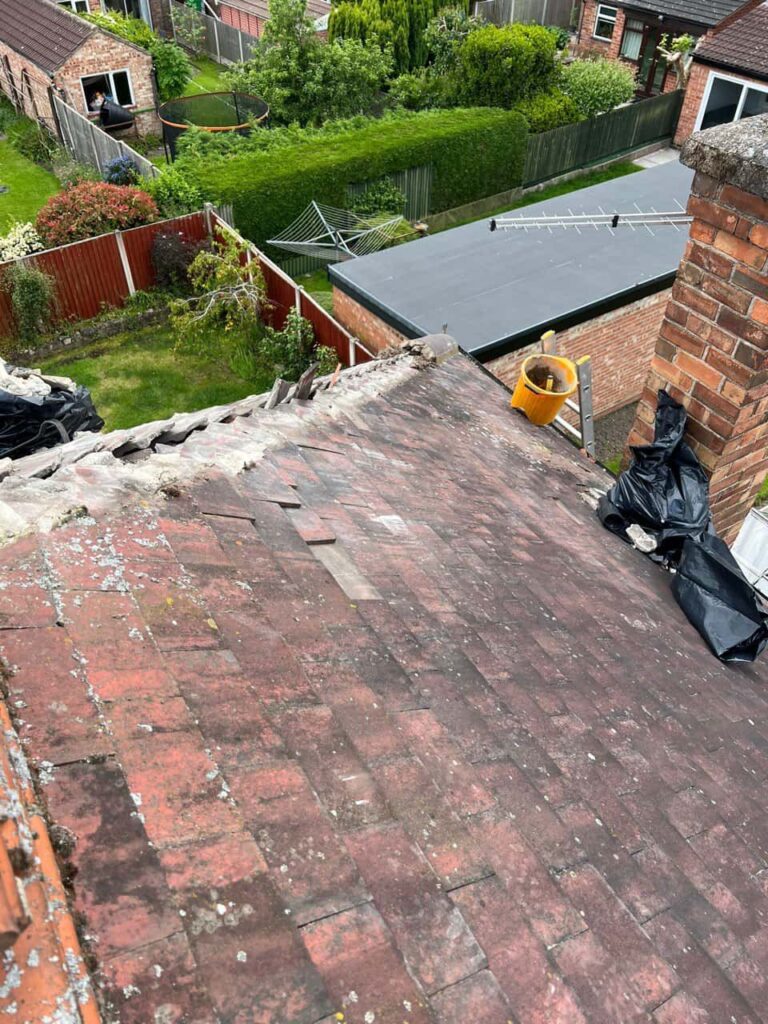The weather in the UK is known for its unpredictability. From heavy rainfall and strong winds to occasional snow, British homeowners need a roofing solution that can withstand these challenging conditions. Pitched roofs, with their distinctive sloped design, have been the traditional choice for homes across the country. In this blog post, we will explore why pitched roofs are ideal for British weather and how they can offer protection and longevity to your property.
1. Effective Water Drainage
One of the key advantages of pitched roofs is their ability to effectively shed rainwater, a necessity in the UK where rainfall is frequent.
- Preventing water accumulation: The slope of a pitched roof ensures that rainwater flows easily off the surface, preventing water from pooling and causing damage. This helps protect your home from leaks and water-related damage, which can be common in areas with high rainfall.
- Reduced risk of water ingress: With the water draining off quickly, pitched roofs reduce the risk of water penetrating through the roof structure, which can lead to dampness, mould, and even rot in your home.
The efficient drainage provided by pitched roofs makes them highly effective in dealing with the frequent and heavy rainfall in the UK.
2. Wind Resistance
The UK can experience powerful winds, particularly during stormy weather. A pitched roof offers better resistance to high winds compared to flat or low-pitched roofs.
- Stability in high winds: The slope of a pitched roof helps to deflect wind rather than allowing it to hit flat surfaces. This reduces the risk of the roof being lifted or damaged by strong gusts, which is crucial during the winter months when wind speeds can be high.
- Stronger structural integrity: Pitched roofs are designed to bear the weight of both snow and wind, making them more durable and able to withstand the pressure of extreme weather conditions. This ensures that your roof remains secure and functional even during stormy periods.
Given the gusty and often stormy weather experienced in the UK, a pitched roof provides a safer, more stable option for homeowners.
3. Snow and Ice Management
While snowfall may not occur every year, the UK does experience occasional winter storms that bring heavy snow. Pitched roofs are particularly effective in managing snow and ice, which can be problematic for flat roofs.
- Snow slides off easily: The steep angle of a pitched roof ensures that snow and ice naturally slide off the surface, preventing the build-up of excessive weight. This reduces the risk of roof damage or collapse caused by snow accumulation.
- Prevention of ice dams: Ice dams can form when melting snow refreezes at the eaves, causing water to back up under shingles. Pitched roofs reduce the chances of ice dam formation by allowing snow and water to flow off the roof without pooling.
A pitched roof is the best way to avoid the risks associated with snow and ice, which are common during the winter months in the UK.
4. Ventilation Benefits
Proper roof ventilation is important for maintaining the energy efficiency of your home, and pitched roofs excel in this area.
- Airflow and moisture control: Pitched roofs allow for better airflow, which helps to regulate the temperature in the attic space. This can prevent the build-up of heat in the summer and moisture in the winter, which can contribute to mould and mildew growth.
- Reduced condensation: Adequate ventilation helps prevent condensation from forming on the underside of the roof, which could lead to water damage over time. Pitched roofs naturally allow for more airflow compared to flat roofs, which tend to trap heat and moisture.
By improving ventilation, pitched roofs help maintain a healthier environment within your home and reduce the risks of moisture-related damage.
5. Durability in Diverse Conditions
Pitched roofs are designed to stand the test of time and can endure various weather conditions over many years.
- Long-lasting materials: The materials commonly used for pitched roofs, such as slate, tile, or metal, are highly durable and can withstand the wear and tear caused by British weather. These materials are resistant to corrosion, weathering, and fading, ensuring your roof continues to perform well for decades.
- Low maintenance: While regular inspections are necessary for any roof, pitched roofs require relatively low maintenance compared to other roof types. Their ability to shed water, resist wind, and manage snow and ice means that they are less prone to damage or deterioration.
The longevity and resilience of pitched roofs make them a reliable investment for homeowners in the UK, especially when compared to alternative roofing options.
Conclusion
Pitched roofs offer a wealth of benefits that make them ideal for the challenging weather conditions in the UK. With their ability to effectively manage rainwater, resist strong winds, and prevent issues caused by snow and ice, pitched roofs provide lasting protection for your home. Additionally, the durability, ventilation benefits, and low maintenance required make them a highly practical and cost-effective roofing solution.
If you’re considering installing or replacing a pitched roof for your property in Abingdon, Oxfordshire, contact LJ Roofing Abingdon. Our experienced team specialises in high-quality roofing solutions that will ensure your home is secure, protected, and well-prepared for any weather condition. Get in touch today for a consultation and find out how we can help you enhance your home with a durable and efficient pitched roof.
Call us on: 01235 425 698
Click here to find out more about LJ Roofing Abingdon
Click here to complete our contact form and see how we can help with your roofing needs.

